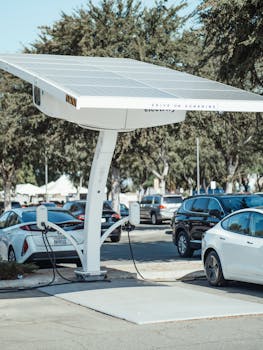
Ford's Michigan EV Battery Plant Secures Future: Federal Tax Credits Remain Intact Despite Inflation Reduction Act Concerns
The Inflation Reduction Act (IRA) has sent ripples through the electric vehicle (EV) industry, causing uncertainty around the eligibility for crucial federal tax credits. However, Ford’s ambitious $3.5 billion electric vehicle battery plant in Marshall, Michigan, can breathe a sigh of relief. Despite initial concerns, the plant remains eligible for substantial federal tax credits under the IRA, a significant boost for the company's electrification strategy and a positive sign for the burgeoning US EV battery manufacturing sector. This development underscores the vital role of government incentives in accelerating the transition to electric mobility and bolstering domestic production.
Navigating the IRA's Complexities: Sourcing and Manufacturing Requirements
The IRA introduced stringent requirements for EV tax credits, focusing on North American sourcing of battery components and the final assembly of vehicles. These stipulations, initially causing confusion and concern, have been clarified, allowing Ford's Michigan plant to maintain its eligibility.
Key Eligibility Factors:
- North American Battery Component Sourcing: A critical aspect for securing IRA tax credits involves sourcing a significant percentage of battery components from North America. Ford has strategically partnered with various suppliers to ensure compliance with these demanding criteria. This commitment to domestic sourcing not only secures tax benefits but also strengthens the US supply chain and reduces reliance on foreign manufacturers.
- Domestic Manufacturing: The location of the battery plant itself – within the United States – is a crucial element contributing to its eligibility for the credits. The Marshall, Michigan plant directly contributes to the goal of boosting domestic EV battery manufacturing, a key objective of the IRA.
- Labor Standards: Compliance with labor standards, ensuring fair wages and working conditions, is another important factor influencing the eligibility of the project for federal incentives. Ford's commitment to responsible labor practices adds further weight to its successful application for these vital tax credits.
These factors underscore the meticulous planning and strategic partnerships undertaken by Ford to navigate the complexities of the IRA and secure the financial benefits designed to propel domestic EV production.
A $3.5 Billion Investment: Boosting Michigan's Economy and US EV Production
Ford's massive investment in the Marshall facility represents a significant commitment to the future of electric vehicles and the revitalization of American manufacturing. The plant, which is a joint venture with SK On, is expected to create thousands of high-paying jobs and inject substantial economic activity into the region. The sustained eligibility for federal tax credits ensures the viability and long-term success of this vital project.
Economic Impact and Job Creation:
- High-paying jobs: The plant is projected to create thousands of direct and indirect jobs, spanning manufacturing, engineering, and support roles. These jobs are not only crucial for the local economy but also contribute to the national skilled workforce in the burgeoning EV sector.
- Supply chain development: The plant's operations will stimulate the growth of a robust domestic supply chain for EV batteries, benefiting numerous supporting industries and fostering innovation.
- Regional economic growth: The substantial investment and resulting economic activity will invigorate the Michigan economy, attracting further investment and development in the region.
The continued eligibility for federal tax credits under the IRA will greatly enhance the project’s economic impact, ensuring its long-term viability and maximizing its contribution to the local, state, and national economies.
The Future of EV Manufacturing in the US: The Role of Government Incentives
The Ford Michigan battery plant's continued access to federal tax credits highlights the importance of government incentives in accelerating the adoption of electric vehicles and establishing a competitive domestic EV battery manufacturing sector. These credits are not just financial assistance; they are a strategic investment in the future of American manufacturing and energy independence.
Government Incentives and the EV Transition:
- Market competitiveness: Government incentives level the playing field, allowing domestic manufacturers to compete more effectively with international rivals in the rapidly growing EV market.
- Technological innovation: The investment spurred by these incentives drives technological advancement in battery technology and manufacturing processes.
- Environmental benefits: The expansion of domestic EV battery production, facilitated by these incentives, accelerates the transition to cleaner transportation and reduces carbon emissions.
The success of Ford’s Michigan plant, bolstered by continued access to federal tax credits, serves as a powerful case study demonstrating the effectiveness of government incentives in fostering growth and innovation within the vital electric vehicle sector.
Addressing Ongoing Challenges and Future Outlook
While the securing of federal tax credits is a significant positive development, challenges remain. The industry continues to grapple with supply chain complexities, the need for skilled labor, and the ongoing evolution of battery technology. Ford, along with other players in the EV sector, will need to continue to adapt and innovate to maintain competitiveness and meet growing demand.
Challenges and Opportunities:
- Supply chain resilience: Maintaining a stable and resilient supply chain remains a critical challenge for the EV battery industry, requiring continued investment in diversification and strategic partnerships.
- Skilled workforce development: Training and attracting a skilled workforce is essential for the successful operation of the plant and the growth of the wider EV sector.
- Technological advancements: Continued innovation in battery technology is vital for enhancing performance, reducing costs, and meeting the evolving needs of consumers.
Despite these challenges, the continued eligibility for federal tax credits provides a strong foundation for the future success of Ford's Michigan EV battery plant and signifies a positive trajectory for the growth of the US electric vehicle sector. The plant's success is a testament to strategic planning, robust partnerships, and the positive impact of government incentives in driving the transition to a cleaner, more sustainable transportation future. This success story should serve as encouragement for further investment in domestic EV manufacturing and the continued development of a thriving US EV ecosystem.




















